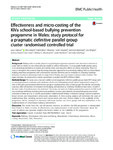Effectiveness and micro-costing of the KiVa school-based bullying prevention programme in Wales: study protocol for a pragmatic definitive parallel group cluster randomised controlled trial
| dc.contributor.author | Clarkson, Suzy | |
| dc.contributor.author | Axford, Nick | |
| dc.contributor.author | Berry, V | |
| dc.contributor.author | Edwards, RT | |
| dc.contributor.author | Bjornstad, G | |
| dc.contributor.author | Wrigley, Z | |
| dc.contributor.author | Charles, J | |
| dc.contributor.author | Hoare, Z | |
| dc.contributor.author | Ukoumunne, OC | |
| dc.contributor.author | Matthews, J | |
| dc.contributor.author | Hutchings, J | |
| dc.date.accessioned | 2018-03-21T21:10:39Z | |
| dc.date.issued | 2015-12 | |
| dc.identifier.issn | 1471-2458 | |
| dc.identifier.issn | 1471-2458 | |
| dc.identifier.other | 104 | |
| dc.identifier.uri | http://hdl.handle.net/10026.1/11142 | |
| dc.description.abstract |
BACKGROUND: Bullying refers to verbal, physical or psychological aggression repeated over time that is intended to cause harm or distress to the victims who are unable to defend themselves. It is a key public health priority owing to its widespread prevalence in schools and harmful short- and long-term effects on victims' well-being. There is a need to strengthen the evidence base by testing innovative approaches to preventing bullying. KiVa is a school-based bullying prevention programme with universal and indicated elements and an emphasis on changing bystander behaviour. It achieved promising results in a large trial in Finland, and now requires testing in other countries. This paper describes the protocol for a cluster randomised controlled trial (RCT) of KiVa in Wales. METHODS/DESIGN: The study uses a two-arm waitlist control pragmatic definitive parallel group cluster RCT design with an embedded process evaluation and calculation of unit cost. Participating schools will be randomised a using a 1:1 ratio to KiVa plus usual provision (intervention group) or usual provision only (control group). The trial has one primary outcome, child self-reported victimisation from bullying, dichotomised as 'victimised' (bullied at least twice a month in the last couple of months) versus 'not victimised'. Secondary outcomes are: bullying perpetration; aspects of child social and emotional well-being (including emotional problems, conduct, peer relations, prosocial behaviour); and school attendance. Follow-up is at 12 months post-baseline. Implementation fidelity is measured through teacher-completed lesson records and independent school-wide observation. A micro-costing analysis will determine the costs of implementing KiVa, including recurrent and non-recurrent unit costs. Factors related to the scalability of the programme will be examined in interviews with head teachers and focus groups with key stakeholders in the implementation of school-based bullying interventions. DISCUSSION: The results from this trial will provide evidence on whether the KiVa programme is transportable from Finland to Wales in terms of effectiveness and implementation. It will provide information about the costs of delivery and generate insights into factors related to the scalability of the programme. TRIAL REGISTRATION: Current Controlled Trials ISRCTN23999021 Date 10-6-13. | |
| dc.format.extent | 104- | |
| dc.format.medium | Electronic | |
| dc.language | en | |
| dc.language.iso | eng | |
| dc.publisher | Springer Science and Business Media LLC | |
| dc.subject | Bullying | |
| dc.subject | Victimisation | |
| dc.subject | Emotional well-being | |
| dc.subject | Absenteeism | |
| dc.subject | School-based | |
| dc.subject | Intervention | |
| dc.subject | Micro-costing | |
| dc.subject | Randomised | |
| dc.subject | KiVa | |
| dc.subject | Prevention | |
| dc.title | Effectiveness and micro-costing of the KiVa school-based bullying prevention programme in Wales: study protocol for a pragmatic definitive parallel group cluster randomised controlled trial | |
| dc.type | journal-article | |
| dc.type | Journal Article | |
| dc.type | Randomized Controlled Trial | |
| dc.type | Research Support, Non-U.S. Gov't | |
| plymouth.author-url | https://www.webofscience.com/api/gateway?GWVersion=2&SrcApp=PARTNER_APP&SrcAuth=LinksAMR&KeyUT=WOS:000369481000001&DestLinkType=FullRecord&DestApp=ALL_WOS&UsrCustomerID=11bb513d99f797142bcfeffcc58ea008 | |
| plymouth.issue | 1 | |
| plymouth.volume | 16 | |
| plymouth.publication-status | Published | |
| plymouth.journal | BMC Public Health | |
| dc.identifier.doi | 10.1186/s12889-016-2746-1 | |
| plymouth.organisational-group | /Plymouth | |
| plymouth.organisational-group | /Plymouth/Faculty of Health | |
| plymouth.organisational-group | /Plymouth/Faculty of Health/Peninsula Medical School | |
| plymouth.organisational-group | /Plymouth/REF 2021 Researchers by UoA | |
| plymouth.organisational-group | /Plymouth/REF 2021 Researchers by UoA/UoA03 Allied Health Professions, Dentistry, Nursing and Pharmacy | |
| plymouth.organisational-group | /Plymouth/Research Groups | |
| plymouth.organisational-group | /Plymouth/Research Groups/FoH - Community and Primary Care | |
| plymouth.organisational-group | /Plymouth/Research Groups/Plymouth Institute of Health and Care Research (PIHR) | |
| plymouth.organisational-group | /Plymouth/Users by role | |
| plymouth.organisational-group | /Plymouth/Users by role/Academics | |
| dc.publisher.place | England | |
| dcterms.dateAccepted | 2016-01-18 | |
| dc.identifier.eissn | 1471-2458 | |
| dc.rights.embargoperiod | No embargo | |
| rioxxterms.versionofrecord | 10.1186/s12889-016-2746-1 | |
| rioxxterms.licenseref.uri | http://www.rioxx.net/licenses/all-rights-reserved | |
| rioxxterms.licenseref.startdate | 2016-02-01 | |
| rioxxterms.type | Journal Article/Review |


